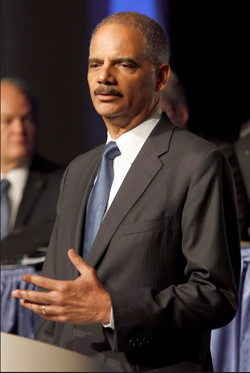Will 2014 be Eric Holder's last year as attorney general?
Eric Holder plans to step down as U.S. attorney general sometime this year, legal analyst Jeffrey Toobin wrote in a New Yorker (sub. req.) article slated to run Feb. 17.
“Holder told me that he will leave office sometime this year,” the article said. “The question is whether he will leave with a triumph or enable his adversaries to limit and restrict the laws that meant the most to him.”
However, a Justice Department spokesman reached out to TPM Livewire and the Huffington Post with a partial transcript of the Holder’s December interview with Toobin and asserted that Holder wasn’t that explicit.

ABA file photo of Eric Holder by Tony Avelar
Toobin asked Holder how much longer he would be attorney general.
Holder: Well, you know, I’ve still got things I want to do. I mean, I’ve got this fight, this criminal justice reform stuff that I talked about, I guess, in August at the ABA. I’ve got financial cases I’m still working on. So I’m going to be here for a while.
Toobin: Do you want to put any more specific … I have to ask all these questions. If you don’t want to tell me, don’t tell me. Like, do you know? A year? Two years?
Holder: I guess, I think what I’ve said is, I’m going to be here certainly into 2014.
Toobin says that transcript is accurate, the Huffington Post reports.
Holder said as recently as November that he has no plans to step down, CBS News reported at the time.
The New Yorker details the first black U.S. attorney general’s work on voter rights issues after Shelby County v. Holder, the recent U.S. Supreme Court opinion that declared part of the 1965 Voter Rights Act unconstitutional.
Undoubtedly, Holder’s time as the U.S. attorney will also be remembered by the Justice Department announcement that it would stop defending the Defense of Marriage Act, as well as his prosecution of individuals accused of leaking government information.
The New Yorker article discusses voting requirements in North Carolina and Texas, which became stricter after Shelby County v. Holder.
“It’s bothersome,” Holder said. “But people should understand that there’s steel here, and I am resolved to oppose any attempts to try to roll back the clock in that way, to try to make it more difficult for people to exercise the most fundamental American right, which is the right to vote.”



